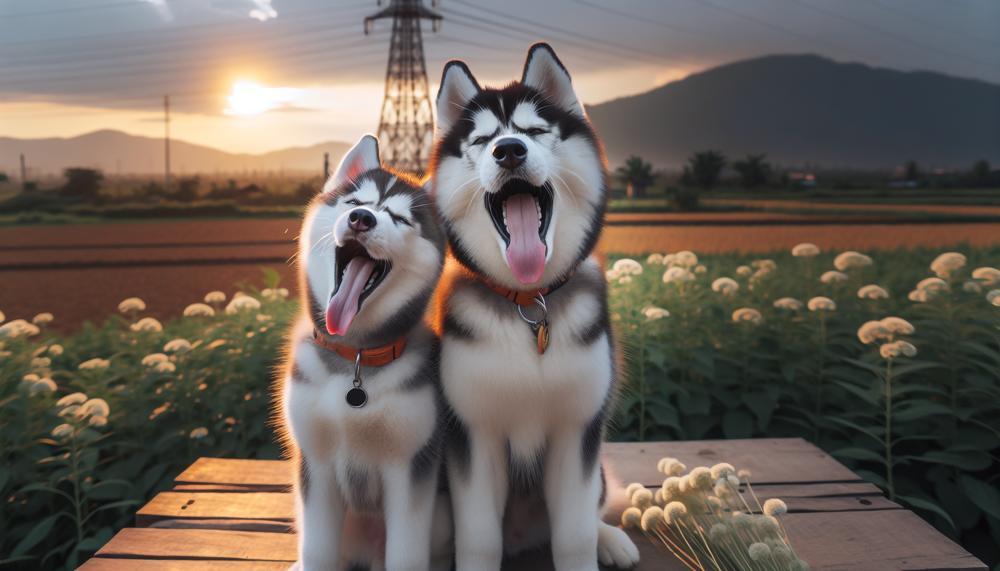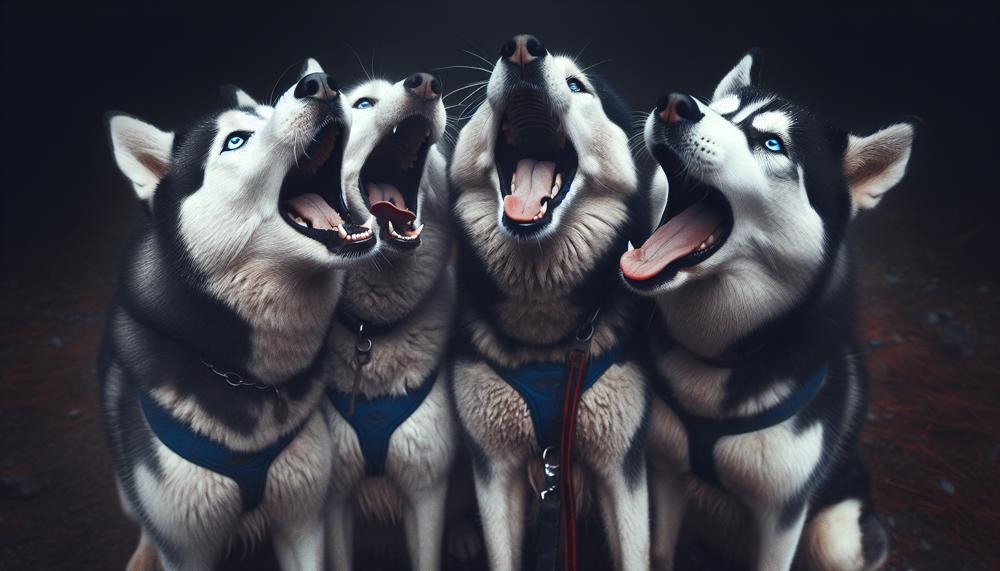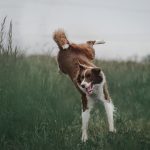Have you ever been entranced by the soulful howls of a husky? Or perhaps you’ve been enchanted by their diverse range of vocalizations, from playful barks to deep growls.
It’s no secret that huskies are renowned for their vocal nature, making them one of the most beloved and distinctive breeds. In this blog post, we’ll delve into the world of husky communication and uncover the reasons behind their expressive tendencies.
From their origins as hard-working sled dogs to their inherent pack mentality, there are numerous factors that contribute to their vocal abilities.
So, sit back, grab your furry companion, and prepare to discover the captivating vocal qualities of huskies. Here’s what we’ll explore:
- The rich history of huskies as sled dogs
- The significance of vocal communication in a pack
- The various types of vocalizations exhibited by huskies
- How to interpret your husky’s unique vocal cues
- Tips for training your husky’s barking behavior
Why are Huskies so vocal? 12 reasons
Table of Contents
- Inherent Behavior: Huskies have a natural inclination towards being vocal, stemming from their ancestral roots as pack animals surviving in rugged environments.
- Emotional Communication: Vocalizations serve as a means of communication and emotional expression for huskies. Their wide range of sounds convey various emotions like frustration, excitement, and anxiety.
- Pack Communication: Similar to their wild counterparts, huskies rely on vocalizations to communicate with their pack members and owners.
- Emotional Awareness: Understanding the context and distinct meanings behind each sound can provide valuable insight into a husky’s emotions and help foster a stronger bond with them.
- Training Importance: Proper vocalization training is essential in effectively communicating with huskies and addressing their emotional needs.
- Natural Instinct: Vocalizations are a natural behavior for huskies and should not be suppressed or punished.
- Positive Reinforcement: Praising and rewarding huskies for their vocalizations can help reinforce their behavior and strengthen the bond between owner and pet.
- Excitement: Howling, barking, and screaming are indicators of feelings of joy or enthusiasm in huskies.
- Frustration: Huskies may also vocalize out of frustration, especially during training sessions. Being able to recognize these cues can create a more positive learning environment for the dog.
- Destructive Behaviors: Excessive barking or howling can result from boredom, lack of mental stimulation, and separation anxiety. Providing adequate exercise and mental stimulation can help curb these behaviors.
- Separation Anxiety: As sensitive animals that thrive on attention from their owners, huskies may become anxious when left alone for extended periods. They may vocalize to express their distress.
- Health Concerns: In some cases, excessive barking or howling may be a sign of underlying health issues such as ADHD or depression. A visit to the vet can help address these issues.
Are Huskies the most vocal?
While these dogs are known for their stunning looks and friendly personalities, you may have also heard that they tend to be more vocal compared to other breeds. But have you ever wondered why this is the case?
Natural Instincts as Pack Animals:
Huskies are descendants of wolves, known for being highly social and pack-oriented animals. This strong pack instinct is still ingrained in Huskies, making them naturally vocal creatures. In the wild, howling and barking is essential for pack communication, allowing them to locate each other and coordinate hunts.
Even as domestic pets, Huskies still possess this instinct and use vocalizations to communicate with their owners and other dogs.
Energetic and Attention-Seeking Nature:
Huskies are energetic dogs that require plenty of exercise to maintain their physical and mental well-being.
They also have a strong desire for attention from their owners, often seeking it through vocal means. This could manifest in howling or barking when they want to play, go for a walk, or simply get attention from their owner.
History as Sled Dogs:
Did you know that Huskies have a rich history as sled dogs? They were originally used by the Chukchi people in Siberia to transport goods and people over long distances. As sled dogs, Huskies needed to communicate effectively with their team members and mushers (the person guiding the sled).
Howling and barking were crucial for coordinating movements and alerting mushers of potential dangers on the trail. This history has likely contributed to the Husky’s vocal tendencies even in domestic settings.
So, are Huskies the most vocal? While it may seem like it at times, it’s important to remember that every dog is unique and has its own personality and tendencies.
However, it’s safe to say that Huskies are more vocal than other breeds due to their natural instincts as pack animals, energetic nature, and history as sled dogs.

How to stop a Husky from being so vocal?
| TIP 1: Uncover the Motivation Behind Your Husky’s Vocalizations | Huskies are intelligent and active canines, and their vocalizations may serve as a means of expressing their needs, communicating with others, or releasing pent-up energy. By understanding the underlying reasons for their vocalizations, owners can address the root cause of this behavior. |
| TIP 2: Provide Sufficient Physical and Mental Stimulation | Huskies require ample daily exercise and mental stimulation to thrive. Insufficient physical activity and mental stimulation can lead to boredom and frustration, which can manifest in excessive vocalizations. Owners should ensure their Husky receives enough exercise through walks, runs, playtime, and interactive toys. |
| TIP 3: Train Your Husky Using Positive Reinforcement | Positive reinforcement training is an effective approach to reduce unwanted behaviors in dogs, including excessive vocalizations. Instead of punishing your Husky for being vocal, reward them when they are quiet and calm. This will teach your Husky that being silent is rewarded and will result in less vocalizations over time. |
| TIP 4: Socialize Your Husky from a Young Age | Huskies are social creatures who thrive in the company of other dogs and humans. However, if they are not properly socialized from a young age, they may develop fear or anxiety, leading to excessive vocalizations. Owners should expose their Husky to various people, animals, and environments to help them feel more at ease and confident. |
| TIP 5: Seek Professional Assistance if Needed | If your Husky’s vocalizations become excessive and difficult to manage, it may be helpful to seek professional help from a certified dog trainer or animal behaviorist. They can provide personalized advice and training techniques to address the specific reasons for your Husky’s vocalizations. |
Conclusion
In conclusion, it is no surprise that huskies are known for their vocal nature, making them a beloved and distinctive breed.
Their history as hard-working sled dogs has instilled in them a strong pack instinct, making vocalizations an essential form of communication. Additionally, huskies use their voices to express emotions and seek attention from their owners.
However, excessive barking or howling can be managed by understanding your husky’s motivations and needs, providing proper exercise and mental stimulation, implementing positive reinforcement training techniques, socializing them from a young age, and seeking professional help if necessary.
By following these tips, you can strengthen your bond with your furry companion and create a peaceful household environment.






